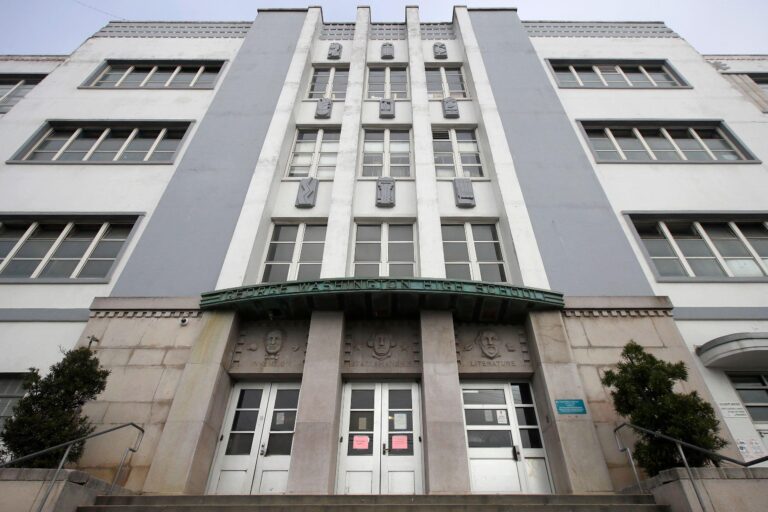In a historic move reflecting growing debates over the legacy of public figures, the San Francisco Board of Education has voted to rename several schools currently bearing the names of George Washington, Abraham Lincoln, and Senator Dianne Feinstein. The decision, announced Wednesday, marks a significant shift in the city’s approach to honoring its public institutions, sparking both support and controversy among community members and stakeholders. This vote comes amid a nationwide reassessment of historical figures whose complex legacies have prompted calls for change in public commemorations.
San Francisco Board Moves to Rename Schools Reflecting Community Values
The San Francisco Board of Education has taken a decisive step to rename several public schools that currently honor figures whose legacies are now viewed as inconsistent with the district’s commitment to equity and inclusion. Among the schools targeted for renaming are those named after George Washington, Abraham Lincoln, and Dianne Feinstein. The move reflects a broader initiative to align school identities with community values that emphasize diversity and social justice. Board members cited research and community feedback highlighting the complexities behind these historical figures’ legacies, particularly their associations with slavery, displacement of Indigenous peoples, and racial discrimination.
Those affected by the decision will undergo a thorough renaming process involving public input, with an emphasis on celebrating local heroes and pioneers whose stories promote unity and inspiration. The board has outlined key criteria for selecting new names:
- Representation: Honoring individuals from diverse racial, cultural, and social backgrounds
- Community Connection: Reflecting local history and contributions within San Francisco
- Inclusivity: Ensuring names resonate positively with students and families
| Current School Name | Legacy Concern | Possible Themes for New Names |
|---|---|---|
| George Washington High School | Slave ownership and colonialism | Indigenous leaders, civil rights activists |
| Abraham Lincoln High School | Racial policies and treatment of Native Americans | Local educators, community champions |
| Dianne Feinstein Middle School | Controversial political decisions on minority communities | Women leaders, social justice advocates |
Controversy Surrounding Historical Figures Sparks Educational Debate
The San Francisco Board of Education has ignited a fierce discourse on how society honors its past by voting to rename several public schools currently bearing the names of George Washington, Abraham Lincoln, and Dianne Feinstein. Critics argue that while these figures made undeniable historical contributions, their legacies also include actions and beliefs that are increasingly viewed as incompatible with today’s values. The decision reflects a growing movement to re-examine the stories we teach and the symbols we elevate, aiming to foster a more inclusive and honest educational environment.
The debate has polarized opinions, with supporters praising the move as a necessary step toward acknowledging historical injustices and opponents warning of erasing history. The Board has proposed a range of new names to better reflect the city’s diverse community, including local activists, Indigenous leaders, and civil rights pioneers. Below is a snapshot of the proposed changes:
| Current School Name | Proposed New Name | Reason/Significance |
|---|---|---|
| George Washington High School | Yick Wo Academy | Honors a Chinese-American community leader |
| Abraham Lincoln High School | Frederick Douglass High School | Celebrates African American abolitionist and orator |
| Dianne Feinstein Elementary | Gloria Steinem School | Recognizes feminist leader and activist |
- Supporters emphasize the importance of reflecting contemporary values in public institutions.
- Opponents caution against rewriting history and losing a connection to traditional narratives.
- Educators face challenges in balancing historical accuracy with evolving social perspectives.
Community and Expert Recommendations Shape New Naming Criteria
The decision to rename the schools came after extensive consultations with community leaders, historians, and education experts, who collectively emphasized the importance of representation and inclusivity in public education spaces. These stakeholders highlighted the need for criteria that reflect diverse cultural backgrounds, promote local heroes, and advance social justice values.
Key factors shaping the new naming guidelines include:
- Historical impact and legacy viewed through a contemporary lens
- Community engagement and voice in the decision-making process
- Alignment with educational goals and values promoting equity
- Recognition of underrepresented figures from local and national histories
| Criteria | Description | Purpose |
|---|---|---|
| Historical Significance | Assessing legacy with contemporary values | Ensure alignment with modern ethical standards |
| Community Input | Incorporating feedback from parents, students, and residents | Foster local ownership and relevance |
| Representation | Highlighting diverse historical and cultural figures | Promote inclusivity and multicultural awareness |
| Educational Value | Names that inspire learning and civic responsibility | Enhance student engagement and pride |
Steps for Inclusive Engagement in School Renaming Process
Successful renaming initiatives require deliberate and transparent processes that actively involve all community voices. Key steps include:
- Early Community Input: Soliciting feedback at the outset ensures concerns and suggestions shape the direction.
- Inclusive Committees: Forming diverse groups representing students, parents, educators, and local leaders fosters balanced perspectives.
- Clear Criteria Establishment: Defining values and goals for new names helps maintain focus and alignment throughout the process.
- Regular Public Updates: Maintaining transparency through open forums, social media, and newsletters builds trust and engagement.
To illustrate the complexity and benefits of stakeholder involvement, consider the following simplified engagement framework used in similar school renaming efforts:
| Phase | Activities | Stakeholders |
|---|---|---|
| Discovery | Community surveys and focus groups | Students, families, educators |
| Evaluation | Forming diverse naming committees; vetting submissions | Committee members, historians, civic leaders |
| Decision | Public forums; community voting | Wider community, school board |
| Implementation | Official announcements; updating signage | District staff, community partners |
To Conclude
As the San Francisco Board of Education moves forward with renaming several schools bearing the names of George Washington, Abraham Lincoln, and Dianne Feinstein, the decision marks a significant moment in the city’s ongoing efforts to address historical representation and community values in education. The changes reflect a broader national conversation about how public institutions commemorate historical figures and whose legacies are celebrated. As the district implements these renamings, stakeholders will be watching closely to see how the new identities of these schools resonate with students, families, and the wider community.




